Karonga hails TNM for K14m hospital
Malawi CSOs asked to champion community colleges initiative
Karonga man arrested for impregnating his granddaughter
Malawi govt condemns chieftaincy wrangles in Karonga: T/A Kilipula installed
Arsonists burn 28 houses over witchcraft claims in Karonga
Karonga defy liquor sachet ban
Mwenefumbo says Karonga cotton farmers worry over Admarc’s move
South African man shot dead in Karonga, Malawi Police confirms
Police in Karonga the northern border district of Malawi are hunting for a criminal gang who have shot dead a South African citizen and robbed him a bag containing cash amounting to 200 US Dollars in the early morning of Saturday at Mufwa Lodge where he camped with his friends.
According to the eye witness , Bosco Kanyika who is a watchman at the lodge the incident happened around 2am on Saturday morning.
The South African man – his identity is being withheld – was on holiday in Karonga when a female traveller woke to three armed men in her tent.
“The thugs first shot in the air and then attacked the South African,” said Kanyika.
“One of the thugs wanted to shoot me but the grace of God I was spared,” he added.
Karonga Police Officer in Charge Edward Chingayipe said the body of the South African who is in his mid 50s from Ballito in Durban, is at the local hospital in Karonga.
He said police were investigating the incident.
The development comes after another Botswana citizen was also shot dead in Karonga at Kiwe roadblock in the month of June this year.
Paladin’s uranium waste ‘wars’, Malawi villagers up in arms
Communities living along the northern part of Lake Malawi in Karonga district have launched a spirited campaign to stop Uranium Miner Paladin Africa Limited from dumping ‘toxic’ waste into Lake Malawi.
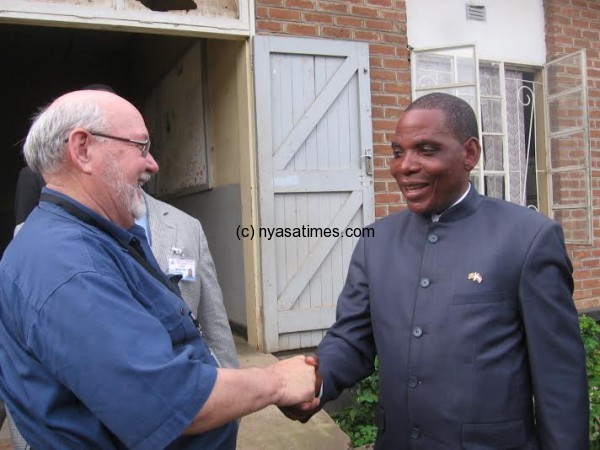
Walker with Malawi Minister of Trade , Joseph Mwanamveka -Photo by Tiwonge Kumwenda, Nyasa Times
They say the move will put people’s lives at risk and damage the environment.
But it seems their fight is being stone walled by the company’s well organised public relations machinery and their own elected government, which has a 15 per cent stake in the company.
The Communities blame the company for deliberately dumping the waste into Sere and Rukuru rivers taking advantage of the country’s 34 year old weak mining law and inadequate enforcement capabilities.
The two rivers discharge into Lake Malawi.
Many people and livestock in rural Malawi rely on rivers and Lake Malawi for water and fish for consumption and commercial purposes.
Paradoxically, Malawi’s Atomic Energy Act No.16 of 2011 provides for the establishment of the Atomic Energy Regulatory Authority, which shall be responsible for radiation protection and safety.
But the establishment of this Authority is yet to take off the ground, according to the Ministry of Natural Resources, Energy and Miningwebsite.
“It is beyond reasonable doubt that there shall be escalated radiation exposure to the people of Karonga and most parts of Malawi since the river directly drains into Lake Malawi. It is a known fact that the sludge, comprises of waste uranium rocks, acids, and other chemicals used in the processing of the yellow cake.
“The sludge still contains 85% of the initial radioactivity of the ore. As a result the sludge still contains 5% to 10% of the uranium initially present in the ore,” reads a statement signed by Influential Paramount Chief Kyungu and 33 Civil Society Organisations CSOs.
But Paladin Africa Limited counter argues that it commenced the release of the treated waste in compliance with the licence criteria set by the Malawi government and also World Health Organisation drinking water guidelines for uranium content.
To show their anger, one resident has dragged the behemoth company to the High Court and seeks to stop the company from continually dumping Uranium waste into these rivers.
“This process (of discharging treated waste) only commenced after an extensive public consultation process, which involved local communities and NGOs, who were invited to participate in the monitoring process,”Paladin said in an 18 page 27 responses to questions and queries from the Centre for Investigative Journalism Malawi (CIJM)in collaboration with the International Consortium of Investigative Journalists (ICIJ).
Karonga Business Coalition spokesperson Wavisanga Silungwe’s application to the High Court borrows heavily from research findings by an independent nuclear engineer, a French citizen, Bruno Cheyron.
Cheyron implored the villagers and NGOs in Malawi to seek answers from Paladin and the Malawi government on who will be held responsible for the consequences of the radioactive by-products once Paladin closes shop.
“Attempts by local anti-mining activists to provoke public disquiet with alarmist and misleading statements are regrettable and disappointing. In this context, an application foran injunction lodged by a local activist is groundless and will be opposed when the matter is heard by the High Court,” Paladin Africa Limited said.
In a miscellaneous civil cause number 29 of 2015, Paladin Africa Limited argues that the application to restrain it from using consent which the Minister under the Water Resources Act granted it is an abuse of the court process.
But the case has stalled because Paladin officials are allegedly not availing themselves for any inter-party hearings, where the High Court expects each part to outline the merits and demerits of their actions.
The company’s General Manager for International Affairs, Greg Walker, denied playing truancy saying he got communication from the High Court that the application for an interlocutory injunction has been set aside.
Judge Dingiswayo Madise in a June 9, 2015 judgement on the matter, ordered Silungwe to proceed by judicial review by challenging the decision to grant consent to Paladin to discharge its waste into the rivers.
However, Paladin said it is treating the liquid waste to meet the World Health Organisation (WHO) drinking water guidelines for uranium, “which is 30 micrograms per litre”.
The Malawi government awarded a license to mine uranium at Kayelekera to Paladin Africa Limited (PAL), an Australian and Canadian registered company in April 2007.
The Mines and Minerals Act (1981), enacted during the reign of former President Hastings Kamuzu Banda, has several deficiencies.
For instance, it vests the power in the President to grant mining licences with no consultation required with other stakeholders, it allows mining companies to operate by bilateral negotiations rather than consistent application of the law which means some companies may get special favours.
It is also devoid of measures to protect people displaced by mining, and has no health and safety regulations for specific mineral extractions such as Uranium.
The government awarded Paladin a licence on July 30th 2014 to discharge the waste during the next two or three wet seasons, depending on how long the mine remains on ‘care and maintenance.’
In February 2014, PAL suspended operations and put the Mine on what it called ‘care and maintenance’. It also laid off the bulk of its employees, about 300 people.
The company cited the declining price of Uranium on the global market in the aftermath of the Fukushima nuclear disaster in Japan in 2011.
However, in its quarterly activities report dated December 31, 2014,the company states that it has started a feasibility study to develop a detailed plan for the recommencement of production at Kayelekera when uranium prices justify.
“Operations will be restarted once the uranium oxide prices increase to over USD75/lb and the mine is connected to the national electricity grid. When these conditions are met, it will take six to nine months to restart mine production and USD60 million will be required to bring the mine back online,” said Walker
Influential Chief Kyungu even asked the government to deport the company’s General Manager for International Affairs, Greg Walker, accusing him of blatantly disregarding the country’s mining legislation for his company’s benefit.
“He is arrogant and his company does not comply with environmental and safety standards at the mine,” Kyungu told the media..
Kyungu even threatened that he will forcefully ‘deport’ Walker from the country if the government fails to do so.
Walker did not respond to these allegations despite several emails.
The company denies the allegations saying the dam, where the liquid toxic waste is stored, spilled some of its contents into the Sere and north Rukuru rivers due to heavy rains.
“On 5 January there has been some “minor storm damage” at the mine. A 20-minute, high-intensity storm resulted in some 25mm of rain falling at the site. Up to 0.05 cubic metres (50 litres) may have overtopped into the local river system,” Walker said.
Paladin also contends that water in the two rivers has had elevated levels of Uranium even before they started operations at Kayelekera.
“An extensive data set collected since 2006 shows that there are naturally occurring uranium levels in the Sere River that have ranged up to 1.76mg/litre,” the Company’s Group Principal Hydro geologist David Holmes disclosed.
Holmes also disclosed that a section of the processing plant at the mine has been modified to enable it to treat waste to remove contaminants prior to release in line with national and international standards.
He said laboratory tests done in March 2014 produced favourable results including the removal of uranium.
“In July, a full scale water treatment plant was set up” Holmes said
Meanwhile, the Ministry of Natural Resources, Energy and Mining said the government is launching an international investigation to ensure that the Mining project has not become a threat to people’s lives.
Three weeks ago, local fishermen started scooping loads of dead fish in the areas where the two rivers discharge into Lake Malawi.
However, four government agencies, in a joint press statement, said they would be launching another investigation to determine what is causing the death of fish.
They hinted that the fish might have died of a natural phenomenon that deprived the waters of oxygen.
In 2013, Paladin disclosed that it had a S$10 million Environmental Performance Bond with two commercial banks in Malawi to, among other things, cater for rehabilitation costs for signs of default during and after mine life.
The bond, in the form of irrevocable letters of credit, will deal with issues like water and environment contamination and the eventual clean up.
- This article is a collaborative effort by the Centre for Investigative Journalism Malawi (CIJM), the Africa Network of Centres for Investigative Reporting (ANCIR) and the International Consortium of Investigative Journalists (ICIJ).
Malawi Police arrest murder suspect of South African national
Police in Karonga the northern border of Malawi has arrested Jimmy Sichone, 29 of Malemia village in the traditional authority Kyungu in the same district who is a prime suspect behind the murder of South African national Harry Wakeford, who was killed in an armed robbery at Mufwa lodge last week Saturday.
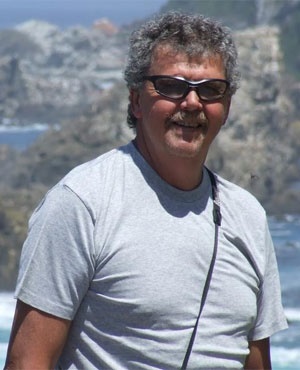
Harry Wakefold murdered in Malawi
Confirming the development to Nyasa Times, Karonga police officer in Charge Edward Chingayipe said the arrest was made on Thursday this week after investigation.
According to Chingayipe, the suspect has admitted during the interrogation and has disclosed the names of his three colleagues.
“Yes we have indeed arrested one of the murderers and has already admitted the crime as well as mentioning the names of his friends during the interrogation,” said Chingayipe.
Adding that “on the three names that were mentioned two of them are Tanzanian nationals while the other one is also from the same district but as of now they are at large.”
But police did not disclose the names.
He said they are working hand in hand with the Tanzanian police to arrest the other suspects.
The South African national was shot and killed when he was accosted by robbers who forced their way into the tent of a female travelling companion in Karonga, Malawi.
The murder victim who was in a team of others who travelled through Zimbabwe, Zambia, Tanzania, and Rwanda to the Virunga National Park in the Democratic Republic of Congo, had reportedly set up camp at a lodge after one of the vehicles in their convoy had broken down.
Malawi Police indicated that the group may have been followed for several days by the men that attacked them.
Meanwhile, the Karonga business community has expressed worry over the increase of the gun crime in the district claiming it has affected the tourism industry as well as sacaring foreign investors in the area.
Karonga business community chairperson Wavisanga Silunge told Nyasa Times that investors and toursists “ will be now afraid to do their business in the district” due to the development.
Mwambande donate maize and fuel to Karonga Hospital
One of the business operators in Karonga the northern part of Malawi known as Mwambande Investment has donated 40 bags of maize weighing 50kg each and 400 litters of fuel to the district hospital with the aim of bailing out the financial problem that the facility is facing.
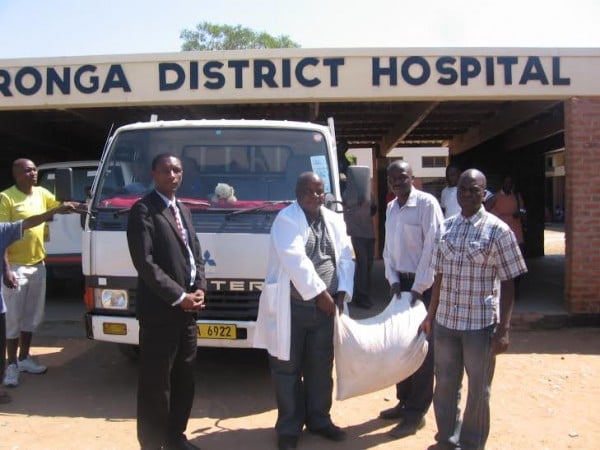
Mwambande presenting bag of maize to hospital officials
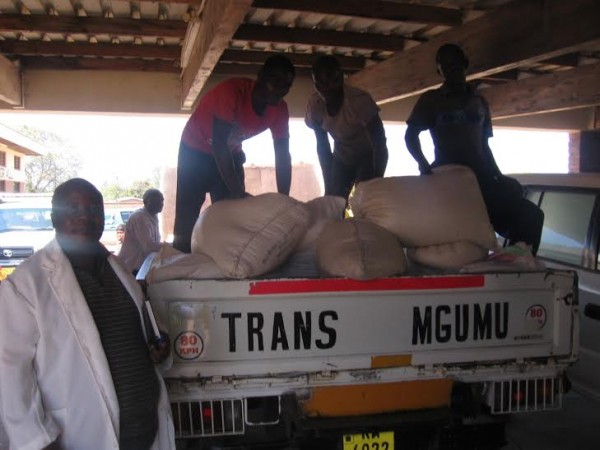
The maize donated to Karonga hospital
Karonga Hospital is scaling down most of its operations as it is still running without government fund since June 2015 a development which led the officials to suspend providing food to admitted patients and taking referral cases.
Mwambande donation follows the statement announced by the District Heath Advisory Committee (HAC) through the local radio informing the general public in the district that the hospital officials will not take part in managing the resources which will be contributed by the community who earlier denied issuing their support fearing that the staff will misuse their resources.
Speaking during the donation, the Managing Director of Mwambande investment Mungasulwa Mwambande said he is concerned with the current situation at the hospital which he described as a “threat to the patients lives.”
Mwambande his donations is part of the company’s social responsibility to the community.
“As a business entity which operates here in Karonga I am very much concerned with the situation which our friends who need medical attention are experiencing at the hospital,” he said.
He then asked other business operators in the district to support the hospital.
Kyungu orders end of Karonga DEC meeting: ‘K8m cashgate’
The paramount Chief Kyungu of Karonga the northern part Malawi, has directed the government officials in the area to abolish the District Executive Committee, saying there are abuses .
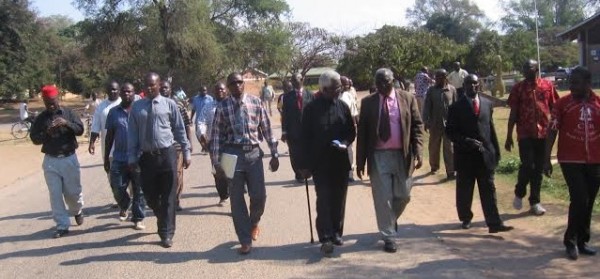
Kyungu leading the leaders to see the controvercial land and houses.
The order has come against the un procedural allocations of land to the district top officials to build their houses, forcing the vendors to pay bribes and squandering of K8 million of Infrastructure Development Fund (IDF).
Speaking during the emergency meeting which was attended by the senior traditional leaders, councillors, business operators, civil society and officials from the District Commissioner, Kyungu wondered where the officers got the money of building the mansions.
According to the Paramount Chief, DEC must be a consortium of traditional leaders and councillors if is to continue because they are the ones who know the need of the community.
“I wonder how you officials managed to build these big houses and a person who gave you the land on top of that I have been told that 8 million Kwacha for IFD is missing at the council which is pathetic, now I declare the dissolution of DEC or else chiefs and councillors must be the members because they are the ones who lead the community,” Kyungu said.
Kyungu warned “if you will not bow down to my order by existing the committee without involving chiefs and councillors we shall invade your meeting and see who is the owner of the district.”
He said there are no development issues that come from the DEC apart from officers getting allowances.
In the DEC meeting top officials from all government departments in the district who also called the technocracy tend to plan and discuss issues on how to develop the district.
Reacting to the development, the district Director of Administration James Tembo who represented the District Commissioner asked the members to call for another meeting which will involve all parties before coming up with conclusions.
Mean while, the leaders have listed three names of top officers to be forcibly transferred in the district, namely the district Monitoring and Environment officer Emmanuel Sohaya, Philemon Maseko who head the land department and the Physical Planning officer Robert Phiri.
Man killed, private parts chopped and no head in Karonga – Malawi Police
Police in Karonga the northern part of Malawi has confirmed the death of an identified man who was found dead on Thursday with a chopped head and private parts floating in Rukuru River by some surrounding villagers of Group Village Headman Peter Mwangalaba in the area of Traditional Authority Kyungu in the district.
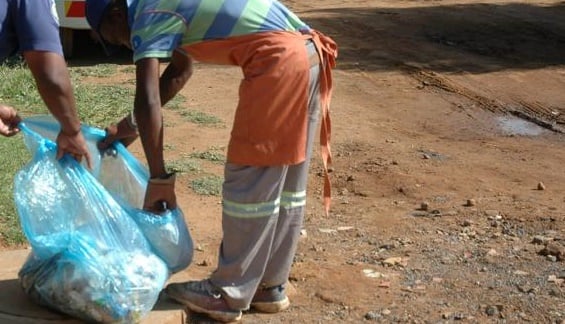
Head hunting
Confirming the development, the district police Officer in Charge Deputy Commissioner Edward Chingayipe, who earlier denied the issue, said the body of the deceased is currently kept at the hospital.
According to Chingayipe no arrest has been made on the matter.
“Indeed we have found the dead body of a man at Rukuru River with no head and private parts chopped,” Chingayipe confirmed.
An eye witness Luka Mwakanema who was grazing cattle within the river banks earlier told Nyasa Times that they found the dead body around 4 PM when he and his colleagues were doing their usual job.
This is a third time incident that a man has been found dead in the district only within the month of June and July 2015.
Kaliati urges Karonga citizens to maintain MPs who deliver

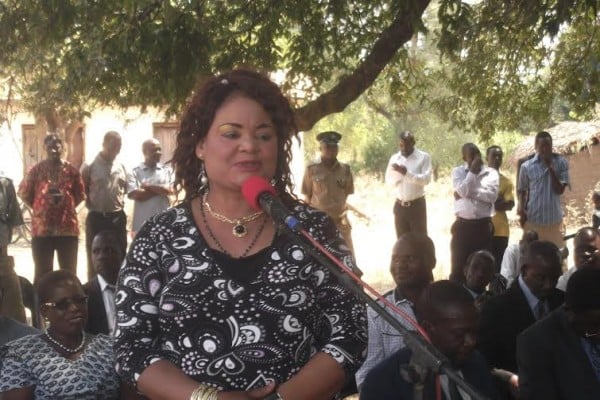 Kaliati speaking in Karonga[/caption]
She made the remarks during her visit in the district where she was responding to the Karonga Central Constituency MP Frank Mwenefumbo appeal of asking government to conduct a civic educate to people of his area in order to avoid political violence.
She pointed out that choosing different candidates in every electoral calendar encourages violence hence the community should stick to an MP who is delivering.
“It is very shameful that up to date over 50 years of independent other areas in the country are still experiencing conflicts during electoral period. We need development in our areas and if an MP is delivering, why changing,” said Kaliati.
“In my constituency everyone know that the area belongs to Patricia Kaliati hence new candidates don’t stand a chance to win in that constituency no matter what, so it is our duty to change the mindset of our community to be having peaceful elections,” she said.
Paramount Chief Kyungu said: “it is true that every electoral period we experience problems in Karonga Central Constituency as such we really need to try some strategies that can help to change the malpractice in the area.”
Kaliati speaking in Karonga[/caption]
She made the remarks during her visit in the district where she was responding to the Karonga Central Constituency MP Frank Mwenefumbo appeal of asking government to conduct a civic educate to people of his area in order to avoid political violence.
She pointed out that choosing different candidates in every electoral calendar encourages violence hence the community should stick to an MP who is delivering.
“It is very shameful that up to date over 50 years of independent other areas in the country are still experiencing conflicts during electoral period. We need development in our areas and if an MP is delivering, why changing,” said Kaliati.
“In my constituency everyone know that the area belongs to Patricia Kaliati hence new candidates don’t stand a chance to win in that constituency no matter what, so it is our duty to change the mindset of our community to be having peaceful elections,” she said.
Paramount Chief Kyungu said: “it is true that every electoral period we experience problems in Karonga Central Constituency as such we really need to try some strategies that can help to change the malpractice in the area.”
10 killed in Karonga road accident involving Siku truck

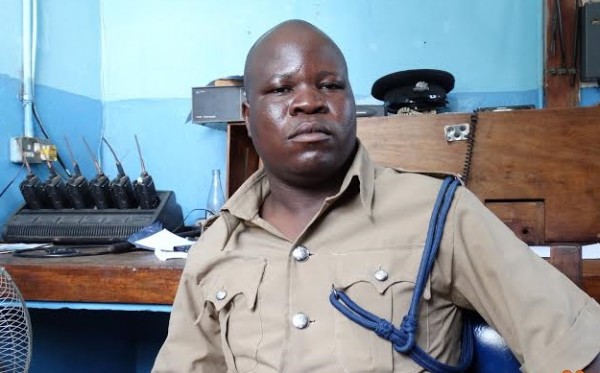 Rivason: Dangerous driving[/caption]
Karonga Police Spokes Person Enock Rivasoni confirmed that a driver and eight passengers died on the spot and one is receiving treatment at Mzuzu Central hospital.
According to Rivasoni, the driver Mathews Kaliwa 63 of Mvula village Traditional Authority Kanyenda in Nkhotakota district was driving a Siku Transport truck registration number SA 7996 horse and trailer SA6773 which carried metal bars with 13 passengers, failed to negotiate a bend and overturned two times.
“It was on Thursday night when a Siku Truck which carried metal bars including people on top overturned two times....as a result the driver and other eight people died on the spot while other four were rushed to our main district hospital and officials there quickly referred one of them to Mzuzu central hospital where he died upon arrival,” said Rivasoni.
“Some of the dead bodies have been identified while others are still at our hospital waiting for their relatives,” he added.
In a related development. on Tuesday one person died and 11 others suffered critical injuries in a minibus accident which occurred at Mlale area in Karonga along M1 road.
It is believed the acident was caused by dangerous driving.
Rivason: Dangerous driving[/caption]
Karonga Police Spokes Person Enock Rivasoni confirmed that a driver and eight passengers died on the spot and one is receiving treatment at Mzuzu Central hospital.
According to Rivasoni, the driver Mathews Kaliwa 63 of Mvula village Traditional Authority Kanyenda in Nkhotakota district was driving a Siku Transport truck registration number SA 7996 horse and trailer SA6773 which carried metal bars with 13 passengers, failed to negotiate a bend and overturned two times.
“It was on Thursday night when a Siku Truck which carried metal bars including people on top overturned two times....as a result the driver and other eight people died on the spot while other four were rushed to our main district hospital and officials there quickly referred one of them to Mzuzu central hospital where he died upon arrival,” said Rivasoni.
“Some of the dead bodies have been identified while others are still at our hospital waiting for their relatives,” he added.
In a related development. on Tuesday one person died and 11 others suffered critical injuries in a minibus accident which occurred at Mlale area in Karonga along M1 road.
It is believed the acident was caused by dangerous driving.
Undule: Our God given natural resources – who benefits?
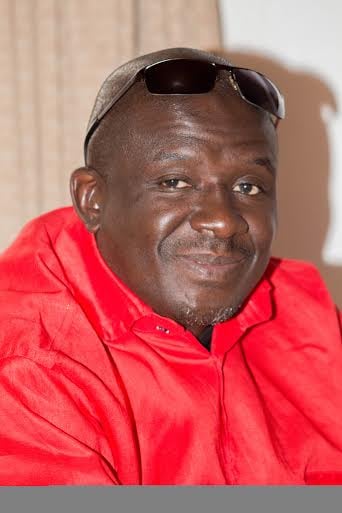
 Undule[/caption]
How we manage our natural resources is something we must take seriously in Africa. The paradox of natural resources has failed to lift the lives of people out of poverty.Our governments have taken themselves to be owners and not custodians in managing natural resources.
Africa has become weaker and powerless in taking steps to help the potential profits from natural resources to benefit millions of poor citizens who go without adequate health, education, nutrition, safe clean water etc.
In recent years we have seen so much excitement in Malawi in regard to mining. The country has taken more interest in the mineral sector to rebalance an economy reliant on agriculture amid climate related challenges and global anti-smoking campaigns that have reduced demand for tobacco which is Malawi main foreign currency earner. But the big question has been how organized are we?
Recently we have seen the nation interests in oil exploration in the northern region. But who will benefit? Looking at how we messed up in uranium mining, no one can dispute the uranium mine was imposed on the people of Karonga. Sad Karonga today is more expensive than it was years back before the mine. The people are more poorer though they were promised travel to the moon. Sure Karonga would not want to play the same game from this oil venture, this time for sure the people must get the share of the cake.
Learning from our mistakes African must use its natural resources productively, in a sustainable manner, to the benefit of our people, and future in which the use of our natural resources lead to development. Africa must shift from being a “resource cursed to “resource blessed continent”.
But how do we manage our natural resources to turn into a blessing for development. First, we must take natural resources as belonging to the people and not governments. Second, profits and revenues should benefit the people not a company or a President. Third, openness and transparency to ensure popular ownership and shared benefits and then good, development oriented leadership. Good national leadership must work at ensuring natural resources revenues fuels national development. Leadership that initiates an open and inclusive national dialogue on the benefits and pitfalls of natural resources.
With national passion let us come up with a profound strategy to manage our resources better and effectively and turn them into a blessing for development. But we must seek GOD’s wisdom for He is the creator of all things in heaven and on earth. Genesis 1:1-33.
Undule[/caption]
How we manage our natural resources is something we must take seriously in Africa. The paradox of natural resources has failed to lift the lives of people out of poverty.Our governments have taken themselves to be owners and not custodians in managing natural resources.
Africa has become weaker and powerless in taking steps to help the potential profits from natural resources to benefit millions of poor citizens who go without adequate health, education, nutrition, safe clean water etc.
In recent years we have seen so much excitement in Malawi in regard to mining. The country has taken more interest in the mineral sector to rebalance an economy reliant on agriculture amid climate related challenges and global anti-smoking campaigns that have reduced demand for tobacco which is Malawi main foreign currency earner. But the big question has been how organized are we?
Recently we have seen the nation interests in oil exploration in the northern region. But who will benefit? Looking at how we messed up in uranium mining, no one can dispute the uranium mine was imposed on the people of Karonga. Sad Karonga today is more expensive than it was years back before the mine. The people are more poorer though they were promised travel to the moon. Sure Karonga would not want to play the same game from this oil venture, this time for sure the people must get the share of the cake.
Learning from our mistakes African must use its natural resources productively, in a sustainable manner, to the benefit of our people, and future in which the use of our natural resources lead to development. Africa must shift from being a “resource cursed to “resource blessed continent”.
But how do we manage our natural resources to turn into a blessing for development. First, we must take natural resources as belonging to the people and not governments. Second, profits and revenues should benefit the people not a company or a President. Third, openness and transparency to ensure popular ownership and shared benefits and then good, development oriented leadership. Good national leadership must work at ensuring natural resources revenues fuels national development. Leadership that initiates an open and inclusive national dialogue on the benefits and pitfalls of natural resources.
With national passion let us come up with a profound strategy to manage our resources better and effectively and turn them into a blessing for development. But we must seek GOD’s wisdom for He is the creator of all things in heaven and on earth. Genesis 1:1-33.
- Undule Mwakasungula, the former director of Center for Human Rights and Rehabilitation (CHRR) and now a human rights columnist on Nyasa Times
Opposition cry foul on DPP victory in Karonga: ‘Mistakes on results sheet were deliberate’

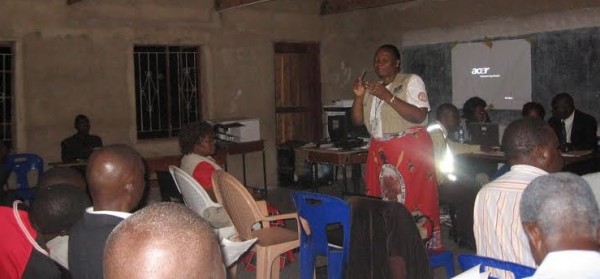 Tembo explaining to parties[/caption]
The two parties were wondering why Malawi Electoral Commission (MEC) officers who were at the polling centres brought the result forms with invalid contents such as signatories of some monitors.
According to the MCP district chairperson Emmanuel Khoma, MEC presiding Officers were not serious in filling the results form, claiming that the mistakes which have occurred are deliberate.
“It cannot be possible that the electoral body officials are coming here at the tally centre presenting the results without some valid information such as monitors signatures, no number of people who have casted their votes even the ballot papers they received at their poling centre as recommended,“ lamented Khoma.
“What does this imply to us as party officials? We can only conclude that MEC was not prepared in conducting this election or maybe they are just here to blindfold us that people have voted while they already have the winner in their mind, above all the MEC officials are coming here without any party monitors,” he added.
Concurring with Khoma, PP District Director of Elections Shambon Mchizi confronted the presiding Officers that they were threatening some monitors not be active in doing their work.
“I visited some of the polling centres monitors where complaining that they are being threatened by some officials hence most they were not involved in confirming the results,” said Mchizi.
Responding to the parties concerns the MEC commissioner Nancy Tembo apologized for the mistakes but described them as minor.
“Indeed our officials of Nkhwawa and Chankholombe polling centres forget to complete filling the result forms with some necessary information but what I can tell you is that those mistakes are minor ones a,” said Tembo.
Tembo blamed the party Officials for selecting monitors which were ignorant on most of the electoral process.
However, when results were announced indicating that Democratic Progressive Party (DPP) candidate Bydon Msiska had polled 1378 votes followed by PP candidate Langford Kanyimbo with 1107, AFORD 587, MCP 446, UDF 23 and Independent with 45 votes all parties left the premises only DPP members were present missing other members to sign the results as witnesses.
Nkhwawa ward had 11076 people who were expected to cast votes, but only 3616 turned up while 37 were null and void presenting 32.62949 percent of the electoral process.
Tembo explaining to parties[/caption]
The two parties were wondering why Malawi Electoral Commission (MEC) officers who were at the polling centres brought the result forms with invalid contents such as signatories of some monitors.
According to the MCP district chairperson Emmanuel Khoma, MEC presiding Officers were not serious in filling the results form, claiming that the mistakes which have occurred are deliberate.
“It cannot be possible that the electoral body officials are coming here at the tally centre presenting the results without some valid information such as monitors signatures, no number of people who have casted their votes even the ballot papers they received at their poling centre as recommended,“ lamented Khoma.
“What does this imply to us as party officials? We can only conclude that MEC was not prepared in conducting this election or maybe they are just here to blindfold us that people have voted while they already have the winner in their mind, above all the MEC officials are coming here without any party monitors,” he added.
Concurring with Khoma, PP District Director of Elections Shambon Mchizi confronted the presiding Officers that they were threatening some monitors not be active in doing their work.
“I visited some of the polling centres monitors where complaining that they are being threatened by some officials hence most they were not involved in confirming the results,” said Mchizi.
Responding to the parties concerns the MEC commissioner Nancy Tembo apologized for the mistakes but described them as minor.
“Indeed our officials of Nkhwawa and Chankholombe polling centres forget to complete filling the result forms with some necessary information but what I can tell you is that those mistakes are minor ones a,” said Tembo.
Tembo blamed the party Officials for selecting monitors which were ignorant on most of the electoral process.
However, when results were announced indicating that Democratic Progressive Party (DPP) candidate Bydon Msiska had polled 1378 votes followed by PP candidate Langford Kanyimbo with 1107, AFORD 587, MCP 446, UDF 23 and Independent with 45 votes all parties left the premises only DPP members were present missing other members to sign the results as witnesses.
Nkhwawa ward had 11076 people who were expected to cast votes, but only 3616 turned up while 37 were null and void presenting 32.62949 percent of the electoral process.
Albino attacks resurfaces in Malawi: Body parts found in Mchinji as abducted Karonga boy throat cut

 Victims of a growing trade in albino body parts.[/caption]
Karonga police spokesperson Enock Livason told Nyasa Times that they law enforcers have prime suspects as Fiskani Mtambo, 35, from Mukwavi Village, Traditional Authority (T/A) Mwenewenya in Chitipa and Sam Wamisi Kaumba, 32, from Cheyama Village, T/A Kyungu in Karonga.
He said on the day of the incident, the two suspects persuaded the boy to accompany them to a nearby market to collect a chicken which his mother had bought, but had ill-motives.
According to Livason, when they got to Ipyana, the two dragged the boy to a nearby forest and started cutting his throat and arm
“Lucky enough, the boy cried for help and well-wishers came to his rescue, but the two suspects managed to escape and we only arrested them after investigations the same day at night,” he said.
Livason said the boy situation is “improving.”
In Mchinji, police spokesman for the district officer sub inspector Moses Kajawa Nyirenda said cops have found the body parts of an albino at Dagrasi Mwale’s garden.
Nyirenda said Police are investigating the matter.
Albinos body parts are desired by witch doctors for use in black magic potions and spells, said to bring love, luck and wealth.
Albinism is a genetically inherited condition that leaves the body unable to produce melanin, the pigment that colours skin, hair and eyes.
Malawi’s Inspector General of Police Lexen Kachama ordered cops to shoot anyone attacking or abducting albinos in a bid to curb the killing of those affected by the condition.
He instructed police to "shoot every criminal who is violent when caught red-handed abducting people with albinism.
“We cannot just watch while our friends with albinism are being killed like animals every day. We do realise that these people are ruthless, have no mercy and therefore need to be treated like that.”
Albino rights activists have called for greater protection of albinos but said that killing suspects was unlikely to deter criminals offered large sums of money for securing body parts as they were likely to still take the risk for the promised reward.
Albinism affects around one in 20,000 people worldwide. It is most common in sub-Saharan Africa.—Additional reporting by Luciano Milala , Nyasa Times
Victims of a growing trade in albino body parts.[/caption]
Karonga police spokesperson Enock Livason told Nyasa Times that they law enforcers have prime suspects as Fiskani Mtambo, 35, from Mukwavi Village, Traditional Authority (T/A) Mwenewenya in Chitipa and Sam Wamisi Kaumba, 32, from Cheyama Village, T/A Kyungu in Karonga.
He said on the day of the incident, the two suspects persuaded the boy to accompany them to a nearby market to collect a chicken which his mother had bought, but had ill-motives.
According to Livason, when they got to Ipyana, the two dragged the boy to a nearby forest and started cutting his throat and arm
“Lucky enough, the boy cried for help and well-wishers came to his rescue, but the two suspects managed to escape and we only arrested them after investigations the same day at night,” he said.
Livason said the boy situation is “improving.”
In Mchinji, police spokesman for the district officer sub inspector Moses Kajawa Nyirenda said cops have found the body parts of an albino at Dagrasi Mwale’s garden.
Nyirenda said Police are investigating the matter.
Albinos body parts are desired by witch doctors for use in black magic potions and spells, said to bring love, luck and wealth.
Albinism is a genetically inherited condition that leaves the body unable to produce melanin, the pigment that colours skin, hair and eyes.
Malawi’s Inspector General of Police Lexen Kachama ordered cops to shoot anyone attacking or abducting albinos in a bid to curb the killing of those affected by the condition.
He instructed police to "shoot every criminal who is violent when caught red-handed abducting people with albinism.
“We cannot just watch while our friends with albinism are being killed like animals every day. We do realise that these people are ruthless, have no mercy and therefore need to be treated like that.”
Albino rights activists have called for greater protection of albinos but said that killing suspects was unlikely to deter criminals offered large sums of money for securing body parts as they were likely to still take the risk for the promised reward.
Albinism affects around one in 20,000 people worldwide. It is most common in sub-Saharan Africa.—Additional reporting by Luciano Milala , Nyasa Times
Karonga demo against Eland Coal Mine over corporate social responsibilities

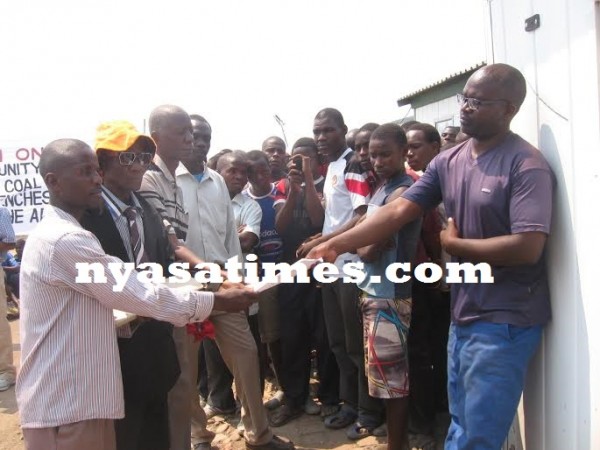 The chief presenting petition to the coal mining manager. - Photo by Tiwonge Kumwenda[/caption]
[caption id="attachment_93967" align="alignright" width="600"]
The chief presenting petition to the coal mining manager. - Photo by Tiwonge Kumwenda[/caption]
[caption id="attachment_93967" align="alignright" width="600"]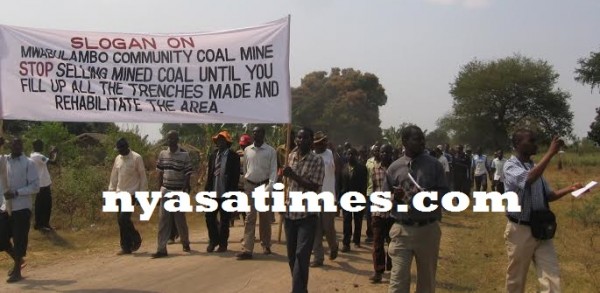 Marching protestors heading to coal mine- Photo by Tiwonge Kumwenda, Nyasa Times[/caption]
The residents accuse the miners of ignoring their commitments detailed in the Memorandum Of Understanding (MOU) in 2013.
Since August 2013, Eland has been under fire for allegedly ignoring the memorandum of understanding which binds it to establish a health centre, expand school and provide safe water as well as electricity to locals affected by mining activity in Mwaulambo.
On 17th August this year, the community from 11 Group Village Headmen such as Mesiya, Mwawulambo, Mwangomba, and Mwanjasi in conjunction with Church and Society Organization of CCAP gave Eland Coal Mine Company a 72 hours ultimatum to start filling its trenches following the allegations that the company has closed the mining site and that the transferring of its equipments is underway.
According to chief Mesiya, the company is taking the people of Karonga for granted as they are also failing to resolve the problems which were caused by its activities.
He warned that within 48 hours if the company still fails to bow down to their demand they will confiscate the company’s remaining equipments.
“When this coal mine started its mining activities in our village in 2007 we thought that our lives will improve due to its social responsibilities that the company was supposed to give us but unfortunately that did not happen but rather they were stealing our resources despite the MOU,” said Mesiya.
“Therefore this is our last warning, after 48 hours if you will not start rehabilitating the Trenches that you have created here, we will come again to confiscate your remaining equipments so that we sell them and the money will help us to do the job you have failed,” lamented angry Mesiya telling the company’s workers.
Mwawulambo Coal Mine Mining Manager Willington Beremauro pleaded with the crowd to extend the period given claiming that the owner of the company is out of the district.
“We indeed received the petition which you wrote to us but we failed to respond because we cannot do that on our own especially because the owner of the company is yet to be in the district as such when he will be here everything will be sorted out,” pleaded Beremauro.
He denied the allegations that the company has closed its mining activities at the site,,
But one of the workers who spoke on condition of anonymity revealed that the company stopped mining in February 2015 and about 26 of its employees have been fired due to the development.
According to the document signed by the Chief Financial Officer Bizwick Kaswaswa and the Mining Manager Willington Beremauro which was posted on the company’s board, notified the workers on the temporary reduction of employee numbers due to the rain season which is approaching.
Mwawi Shawa, desk officer for Justice and Peace Department in Karonga Diocese which is implementing Transparency Initiative within Our Natural Extractives (Tiwone), said it was in the interest of justice for Eland to honour the agreement.
“As the Catholic Commission for Peace and Justice, we have a preferential option that requires us to side with the vulnerable. Likewise, we hope Eland will respect the agreement for justice and peace’s sake,” said Shaba.
President Peter Mutharika has conceded that Malawi has not benefitted from minerals due to poor bargaining at the initial stage,
“I think we need to review the way we award licences to institutions which have the capacity to explore [for] minerals in this country,” said Mutharika in a special programme with taxpayer-funded Malawi Broadcasting Corporation (MBC) at Kamuzu Palace in Lilongwe.
Mutharika said as “a trustee of Malawi Government property and resources” he will not allow them to be exploited.
“If Malawians can’t benefit from these resources, then we will let them [resources] lie idle for the future generations to use, otherwise we have to be wise in these dealings,” he said.
Marching protestors heading to coal mine- Photo by Tiwonge Kumwenda, Nyasa Times[/caption]
The residents accuse the miners of ignoring their commitments detailed in the Memorandum Of Understanding (MOU) in 2013.
Since August 2013, Eland has been under fire for allegedly ignoring the memorandum of understanding which binds it to establish a health centre, expand school and provide safe water as well as electricity to locals affected by mining activity in Mwaulambo.
On 17th August this year, the community from 11 Group Village Headmen such as Mesiya, Mwawulambo, Mwangomba, and Mwanjasi in conjunction with Church and Society Organization of CCAP gave Eland Coal Mine Company a 72 hours ultimatum to start filling its trenches following the allegations that the company has closed the mining site and that the transferring of its equipments is underway.
According to chief Mesiya, the company is taking the people of Karonga for granted as they are also failing to resolve the problems which were caused by its activities.
He warned that within 48 hours if the company still fails to bow down to their demand they will confiscate the company’s remaining equipments.
“When this coal mine started its mining activities in our village in 2007 we thought that our lives will improve due to its social responsibilities that the company was supposed to give us but unfortunately that did not happen but rather they were stealing our resources despite the MOU,” said Mesiya.
“Therefore this is our last warning, after 48 hours if you will not start rehabilitating the Trenches that you have created here, we will come again to confiscate your remaining equipments so that we sell them and the money will help us to do the job you have failed,” lamented angry Mesiya telling the company’s workers.
Mwawulambo Coal Mine Mining Manager Willington Beremauro pleaded with the crowd to extend the period given claiming that the owner of the company is out of the district.
“We indeed received the petition which you wrote to us but we failed to respond because we cannot do that on our own especially because the owner of the company is yet to be in the district as such when he will be here everything will be sorted out,” pleaded Beremauro.
He denied the allegations that the company has closed its mining activities at the site,,
But one of the workers who spoke on condition of anonymity revealed that the company stopped mining in February 2015 and about 26 of its employees have been fired due to the development.
According to the document signed by the Chief Financial Officer Bizwick Kaswaswa and the Mining Manager Willington Beremauro which was posted on the company’s board, notified the workers on the temporary reduction of employee numbers due to the rain season which is approaching.
Mwawi Shawa, desk officer for Justice and Peace Department in Karonga Diocese which is implementing Transparency Initiative within Our Natural Extractives (Tiwone), said it was in the interest of justice for Eland to honour the agreement.
“As the Catholic Commission for Peace and Justice, we have a preferential option that requires us to side with the vulnerable. Likewise, we hope Eland will respect the agreement for justice and peace’s sake,” said Shaba.
President Peter Mutharika has conceded that Malawi has not benefitted from minerals due to poor bargaining at the initial stage,
“I think we need to review the way we award licences to institutions which have the capacity to explore [for] minerals in this country,” said Mutharika in a special programme with taxpayer-funded Malawi Broadcasting Corporation (MBC) at Kamuzu Palace in Lilongwe.
Mutharika said as “a trustee of Malawi Government property and resources” he will not allow them to be exploited.
“If Malawians can’t benefit from these resources, then we will let them [resources] lie idle for the future generations to use, otherwise we have to be wise in these dealings,” he said.
Karonga women bartering sex with clean water: CCJP blames Malawi govt for crisis

 Kaliati warns against sexual abuse[/caption]
Minister of Gender, Children, Disability and Social Welfare, Patricia Kaliati, recently urged Malawi women to remain vigilant and refuse any demands for sex encounters in exchange of any service.
She urged communities to report any misconduct by officials taking advantage of body currency of Malawi women..
“No one should take advantage of the plight of you the poor to coax anyone, especially women and girls, into a sexual relationship,” Kaliati cautioned.
A survey conducted by Karonga CCJP shows that the district’s water woes are very pathetic as the population density is also on the rise.
“As it stands, the district is in need of extra 600 boreholes to rectify the water challenge but the current allocation of about K150 000 per month at the district council for water and sanitation is not enough to meet the required demand,” said Karonga CCJP Project Officer Lewis Nkhata in an interview with Nyasa Times.
Nkhata said a lot of boreholes in the district are non-functional because they are either of substandard or the taste of water is very salty.
“Some of the boreholes were just drilled anyhow without conducting visibility studies and others mainly in the southern part of the district have salty water that whenever they use them for cooking the food could turn yellow and the teeth of the under five children could also turn to the same colour.
“So because there has never been any scientific study to find out if there are some health hazards, the communities have abandoned them and return to their usual sources of unprotected water sources which is very dangerous,” he said.
Nkhata said as CCJP, they are empowering the communities and local leaders with knowledge to monitor visibility studies and drilling processes of the water points.
Malawi’s report on Malawi Growth and Development Strategy (MGDS) I and II notes that there is an increase in population with access to safe and portable water, whilst the Malawi Economic Justice Network (MEJN) report of 2010 speaks to the contrary indicating that majority of the population are yet to have access to clean and portable water as a
result of dysfunctional water points.
Kaliati warns against sexual abuse[/caption]
Minister of Gender, Children, Disability and Social Welfare, Patricia Kaliati, recently urged Malawi women to remain vigilant and refuse any demands for sex encounters in exchange of any service.
She urged communities to report any misconduct by officials taking advantage of body currency of Malawi women..
“No one should take advantage of the plight of you the poor to coax anyone, especially women and girls, into a sexual relationship,” Kaliati cautioned.
A survey conducted by Karonga CCJP shows that the district’s water woes are very pathetic as the population density is also on the rise.
“As it stands, the district is in need of extra 600 boreholes to rectify the water challenge but the current allocation of about K150 000 per month at the district council for water and sanitation is not enough to meet the required demand,” said Karonga CCJP Project Officer Lewis Nkhata in an interview with Nyasa Times.
Nkhata said a lot of boreholes in the district are non-functional because they are either of substandard or the taste of water is very salty.
“Some of the boreholes were just drilled anyhow without conducting visibility studies and others mainly in the southern part of the district have salty water that whenever they use them for cooking the food could turn yellow and the teeth of the under five children could also turn to the same colour.
“So because there has never been any scientific study to find out if there are some health hazards, the communities have abandoned them and return to their usual sources of unprotected water sources which is very dangerous,” he said.
Nkhata said as CCJP, they are empowering the communities and local leaders with knowledge to monitor visibility studies and drilling processes of the water points.
Malawi’s report on Malawi Growth and Development Strategy (MGDS) I and II notes that there is an increase in population with access to safe and portable water, whilst the Malawi Economic Justice Network (MEJN) report of 2010 speaks to the contrary indicating that majority of the population are yet to have access to clean and portable water as a
result of dysfunctional water points.